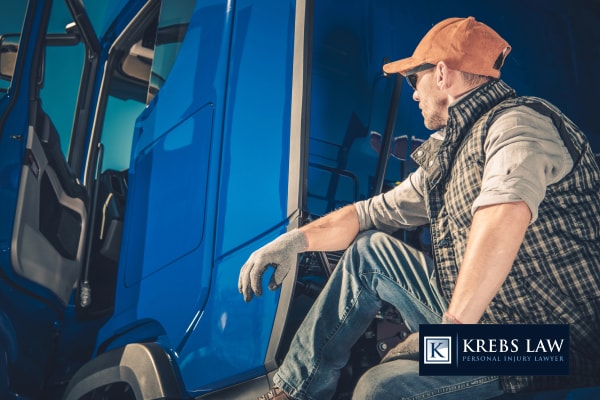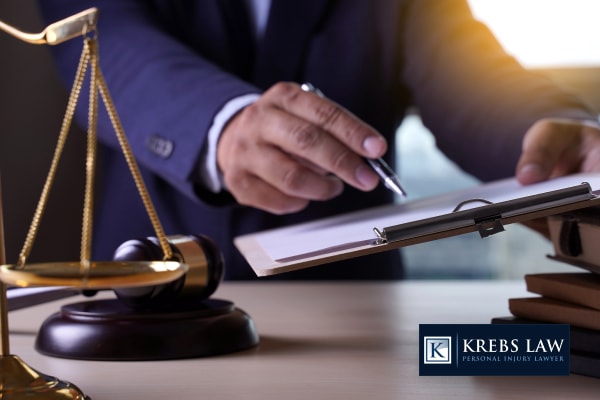This page was written, edited, reviewed & approved by JR Krebs following our comprehensive editorial guidelines. JR Krebs, the Founding Partner, has years of legal experience as a bankruptcy attorney. Our last modified date shows when this page was last reviewed.

At Krebs Law Personal Injury Lawyers, our truck accident lawyer helps victims understand how vicarious liability applies in commercial truck crashes. This legal concept holds employers responsible for their employees’ actions while on the job. In a truck accident case, that means a trucking company may be liable for the damage caused by its driver. This rule is critical in the trucking industry, where company oversight and safety practices directly affect road safety.
Data from the National Highway Traffic Safety Administration (NHTSA) indicates that 528,177 large trucks were involved in police-reported traffic crashes nationwide in 2023, with the majority of these incidents occurring while commercial truck drivers were on duty. Understanding vicarious liability helps injured parties identify all responsible companies and seek full compensation.
Vicarious liability, also known as “respondeat superior,” is a legal concept that holds employers responsible for the negligent acts of their employees. In truck accident cases, it applies when a driver causes a crash while performing job-related duties. For example, if a truck driver rear-ends a car during a delivery route, the trucking company may also be held liable.
This principle encourages employers to properly maintain their vehicles, hire qualified drivers, and enforce safety rules. At Krebs Law Personal Injury Lawyers, we use this law to ensure both the driver and the company are held accountable when negligence causes serious injury.

Truck accident claims are often more complex than car accident cases because multiple parties may share responsibility. Trucking companies typically have more comprehensive insurance policies than individual drivers. Proving the company is liable can result in higher compensation for the injured party.
Employers may be held responsible if their drivers were acting within the scope of their employment at the time of the crash. We focus on using vicarious liability to make responsible parties accountable and help victims pursue compensation for medical bills, lost wages, and pain and suffering.
Vicarious liability applies only under certain conditions. The court looks at whether the driver was performing job-related duties or acting on personal time. It also considers factors like the company’s control over the driver, employment contracts, and whether the act benefited the employer. Understanding these details is key to proving whether the company can be held liable.
If a driver was completing a delivery, hauling goods, or traveling on an assigned route, the company can be held liable. These acts are considered within the scope of employment because they are part of the driver’s job duties. Even if a driver made a small mistake or broke a traffic rule, the employer may still share responsibility. At Krebs Law Personal Injury Lawyers, we gather evidence to show how the driver’s actions were connected to their work.
A trucking company is not always responsible for a driver’s negligence. If the driver was off duty, using the truck for a personal errand, or violating company policy, the employer may not be held accountable. In these cases, the driver could face personal liability for their actions. However, if the company ignored safety violations or failed to monitor its drivers, we work to prove direct negligence. Our legal team investigates every angle to identify all potentially liable parties and ensure our clients receive fair compensation.

Establishing who is responsible after a truck accident requires strong evidence and a clear understanding of vicarious liability. At Krebs Law Personal Injury Lawyers, we know that a trucking company may be held accountable if the crash occurred while the driver was performing work duties.
Our truck accident lawyers gather documentation, witness statements, and employment records to establish the employer's liability. This step is vital for a personal injury claim and ensures that all responsible parties are identified. By showing the company’s role in the driver’s actions, we help victims seek compensation for their losses.
To establish vicarious liability, we first confirm that the truck driver was employed or under contract with the company when the accident occurred. Employment files, payroll records, or communication logs can prove this connection. This step is key in showing that the driver or trucking company had an employee-employer relationship at the time of the crash.
Next, we determine if the driver was completing assigned tasks, such as making deliveries or following a scheduled route. If the crash happened while performing job-related duties, the company can be held liable. Understanding the driver’s purpose on the road helps us prove vicarious liability in the legal claim.
Another crucial factor is proving employer control over the truck involved in the collision. If the trucking company owned, leased, or managed the vehicle, it may be responsible for any negligent actions. We collect maintenance records, registration documents, and company policies to show who had control of the vehicle and its operation.
Trucking companies often label drivers as independent contractors to limit financial responsibility after a crash. However, this classification doesn’t always hold up under Alabama’s personal injury law. If the company controls the driver’s schedule, work methods, or branding, it may still be considered an employer.
We examine driver qualifications, supervision records, and contracts to challenge improper classifications. Our legal team works to prove when employer control exists, even if the driver is listed as an independent contractor. This helps ensure the company remains accountable for unsafe practices or negligent hiring.

Vicarious liability focuses on holding the company liable for its employee’s actions. Employer negligence, on the other hand, involves the company’s own careless behavior. Examples include negligent hiring, poor driver training, or failure to maintain trucks properly. Both claims can exist in the same personal injury lawsuit. At Krebs Law Personal Injury Lawyers, we build cases that include every possible form of negligence to strengthen your chance of full recovery and fair compensation.
Vicarious liability applies when a truck driver’s actions cause harm while performing job-related duties. For example:
Each example shows how both the driver and the employer can share responsibility when negligence occurs within the scope of employment. We use these scenarios to help clients understand how vicarious liability can strengthen cases against trucking companies and other potentially liable parties.
Proving who is legally responsible after a truck accident requires strong documentation and careful review. At Krebs Law Personal Injury Lawyers, we collect detailed records to show how and why the crash happened. Evidence helps prove that the trucking company should be held accountable when its driver violates traffic laws or company safety rules. This information supports every step of the legal process and ensures that more than one party can be held liable if needed.
Key evidence includes:

Trucking companies often deny responsibility after a crash to protect their profits. They may use several defenses to avoid paying victims fair compensation, such as:
We counter these tactics with clear evidence that shows the driver was performing job-related duties and following company orders at the time of the crash. Our truck accident lawyers gather records, logs, and company policies to hold every employer accountable for reckless driving and unsafe practices.
Federal Motor Carrier Safety Administration (FMCSA) regulations set clear standards for driver qualifications and company safety. These rules exist to protect the public and prevent accidents. Violations of these regulations often help establish vicarious liability. Common federal requirements include:
When trucking companies ignore these federal or Alabama state laws, they can be held responsible for any harm caused. We review compliance reports and service violations to show where safety rules were broken and strengthen your legal claim.
When a trucking company is found liable, victims often receive a more complete financial recovery. Corporate insurance policies have higher limits than most individual drivers’ plans, providing greater coverage for damages. Victims may be able to recover compensation for:
If more than one party contributed to the accident, we pursue every responsible party to ensure full and fair compensation. At Krebs Law Personal Injury Lawyers, we fight to help victims rebuild their lives and restore financial stability.
We take a detailed and strategic approach to proving employer accountability. Our legal process focuses on uncovering key facts and evidence that link the company to the driver’s negligent actions. Our investigation includes:
With decades of experience in personal injury law, we understand how to establish liability and pursue fair settlements for our clients. We work to ensure every employer is held legally responsible for the harm caused by unsafe drivers or poor company practices.
What does vicarious liability mean in a truck accident case?
Vicarious liability means a trucking company can be held responsible for its driver's actions if the crash occurred while the driver was performing job duties.
How do courts decide if a driver was on duty?
Courts review schedules, delivery routes, and dispatch logs to determine whether the driver was working within the scope of employment at the time of the accident.
What if the driver made a personal stop before the crash?
If the driver was running a personal errand, the company may not be liable. However, we investigate whether the stop was part of the delivery route.
Can a trucking company still be liable for an independent contractor?
Yes. If the company controlled the driver’s hours, routes, or behavior, it may still be held legally responsible despite the “independent contractor” title.
How can I prove the company controlled the driver’s work?
We collect employment contracts, communication logs, and safety policies showing how much control the company had over the driver’s daily work and job decisions.
What evidence shows that an employer was responsible?
Key evidence includes black-box data, driver logs, vehicle maintenance reports, and company rules that reveal unsafe practices or service violations.
Can black box data help prove liability?
Yes. Black box data records the truck’s speed, braking, and route before impact. This helps us show how the crash happened and who was at fault.

At Krebs Law Personal Injury Lawyers, we are committed to helping victims of commercial truck crashes throughout Alabama. We understand when a trucking company should be held accountable under vicarious liability laws. Our legal team investigates every detail to build strong claims and recover full compensation for injured clients.
We offer a free case evaluation with no upfront fees, and you only pay if we win your case. Our goal is to protect your rights, hold negligent companies accountable, and help you rebuild after a serious accident.
If you’ve been injured in a commercial truck accident, let Krebs Law Personal Injury Lawyers fight to hold the trucking company accountable and pursue the justice you deserve.

J.R. is dedicated to providing personalized representation, avoiding a one-size-fits-all approach. He tailors his strategy to the unique challenges and needs of each client and case, ensuring focused and individualized attention.
His practice mainly covers Plaintiff’s Personal Injury, including car and 18-wheeler accidents, slips and falls, dog bites, defective products, and wrongful death. He also handles commercial disputes on contingency, with experience in contracts, construction, and probate. For any dispute headed toward litigation, J.R. develops an aggressive strategy to maximize your recovery through negotiation, arbitration, or trial.
"*" indicates required fields